Carrie (1976)
Directed by: Brian De Palma
Written by: Lawrence D. Cohen, Stephen King
Starring: Amy Irving, Piper Laurie, Sissy Spacek, William Katt
HCF REWIND NO.171: CARRIE [1976]
AVAILABLE ON DVD AND BLU-RAY
RUNNING TIME: 96 min
REVIEWED BY: Dr Lenera, Official HCF Critic
One day at the gym during the showers, Carrie White experiences her first period. Having no prior knowledge of menstruation, Carrie believes she is bleeding to death. The other girls react by throwing tampons and sanitary pads at her. A frantic Carrie somehow bursts a light bulb with her mind, and later causes an ashtray to fall on the floor. At home, Carrie’s unstable, fanatically religious mother Margaret hears about the locker room incident and locks her into a closet to pray for forgiveness from the ‘’curse of blood”. The next day, Carrie’s teacher Miss Collins subjects Carrie’s tormenters to a week-long boot-camp-style detention, but the worst of the bullies Chris Hargensen storms off the field and is banned from the prom. Sue, feeling guilty for teasing Carrie, convinces her boyfriend Tommy Ross to invite Carrie to the prom….
So here I am, beginning my revisiting of all the Carrie films prior to watching the new version, meaning that I’m not only going to brave The Rage: Carrie 2 again but also view the first remake. First remake? Yes, there was actually a version of Carrie made in 2002 that isn’t too widely seen, probably because it was made for TV. Anyway, I’m getting ahead of myself, so let’s return to 1976 and Brian De Palma’s lyrical, touching, yet also sometimes very funny horror classic that remains the third best Stephen King-derived film [though King would probably say it’s the second best, given his feelings about a certain Stanley Kubrick film]. Though is it really a horror film? It certainly becomes one towards the end, finishing with the greatest jump scare in the history of the genre. However, prior to that, while it has its very dark elements, it doesn’t really come across as being horror at all to me. Maybe it’s just me. What it is is a twisted modern fairytale with distinct elements of Cinderella and The Ugly Duckling, the charge and feeling of its tragic story refusing to get lost in its director’s fireworks, though it’s also a superb example of De Palma’s great skill in playing with an audience as well as damn stunning filmmaking in its own right.
Carrie was the first novel by Stephen King novel to be published, basing the title character on two people he knew when he was a teacher. I’ve read the book and to be honest it isn’t too well written compared to his later work, but a powerful, affecting tale it still is, and it’s easy to see why a lot of studios were considering it. Lawrence D. Cohen’s first script followed the book closely, but successive drafts altered many details, especially towards the end. Notable changes were Sue not thinking she is pregnant, Carrie and her mother not being ugly, Carrie not reading Sue’s mind and finding out she had nothing to do with the prank, and Sue n ot having her period and beginning to write a book about the events [this was replaced by the nightmare finale]. A scripted scene from the novel where Carrie blows up petrol stations with her mind, setting the town on fire, wasn’t filmed due to cost, while opening and closing scenes of Carrie’s house being pummelled by stones weren’t used due to the effects not looking good, though if you look closely certain shots remain in the film. The auditions for Carrie occurred at the same time as those for Star Wars, and many cast members read for characters in the other film, though rumours that Sissy Spacek was originally cast as Princess Leia, and Carrie Fisher was Carrie have been dispelled. What is certain is that Spacek was going to play Chris the bully until she read for all the other female parts. De Palma cut some of Irving’s scenes from the final cut, including a love scene with William Katt. Carrie was a big hit and got good notices too, with both Spacek and Piper Laurie nominated for Oscars.
Carrie begins with the camera tracking past college girl’s changing rooms, each room showing the girls in further states of undress. It’s a typical example of De Palma titillation, the slow motion and the soft focus photography certainly aiding in making the scene quite erotic [well, if you’re a man] but also importantly contrasts the happiness of all the girls, totally at home with their bodies and indeed their burgeoning sexuality, with Carrie, who has her first period occur and is horrified. The sight of Carrie crying and reaching out for help, her nudity pathetic and awkward, and the cruelty of the other girls, is rather harrowing. After this, the film has a light tone for a while, the scenes at Bates [named after Norman of course] High School almost prefiguring films like Heathers and Mean Girls in their wry look at high school life, while the scenes with Carrie and her crazed mother, surely the most convincingly bonkers religious nut-job in films, are comic in a blacker way. Carrie realises she is telekinetic, but the film is restrained in showing this, choosing instead to emphasises the sadness of Carrie’s existence and slowly but surely, build up to the highlight in most US high schoolers: the prom. I guess by today’s standards much of this is a little slow, and as I said earlier not really horror, but it exhibits total faith in its audience’s patience.
We finally get to the prom, and cinematographer Mario Tosi shoots it like an idealised version of a prom, all lush greens and reds, emphasising the impact it has on Carrie, whose first time ‘out’ it really is. Spacek is especially superb here, with her face lighting up in wonder s Carrie virtually becomes beautiful. The background music becomes a gorgeous vocal version of composer Pino Donaggio’s main theme, Katie Irving’s ethereal voice really adding to the beauty of the scene. God Damn it, even as I write this I get emotional at Carrie finally having a happy time. De Palma is often considered something of a cold, heartless technician by critics, and he can be, but he also has a deeply heartfelt side to him that can be seen in films as diverse as Obsession and Casualties Of War. How can anyone can watch the prom section in Carrie and not be very touched? It reaches a delirious romantic climax, which seems to go on forever, when Carrie and Tommy, the boy who has been asked by his girlfriend Sue to take Carrie to the prom, and who may just be falling for her himself, dance to an even more beautiful song, the camera spinning round and round them, and they also spinning round and round on a platform, surely De Palma’s best use of this favourite device of this. Then Tommy and Carrie get up on stage, having been crowned prom king and queen, and I sometimes want to switch off the DVD at this point and leave Carrie at the shining moment of her life, beaming and popular, because I don’t want things to go wrong!
However, go wrong they do. The build-up to Carrie having the pig’s blood poured over her is a lesson in how to make the most out of what would be a tense couple of minutes and turn it into a masterclass of suspense creating. As the editing gets faster, the film actually goes into slow motion, De Palma working up the viewer into such a state that he or she ends up wanting that bloody bucket to tip. The film leaves it ambiguous as to whether everyone is actually laughing at Carrie or she is just imagining it. It’s maybe a flaw that, when Carrie lets loose [De Palma originally shot all of the prom rampage in split-screen but felt only a few shots worked so just retained those in the format], nice as well as nasty people bite the dust, but then this is the 70’s when filmmakers seemed more willing to be ambiguous and cruel and have things occur which you just don’t want to happen. Perhaps the final scene, which has nice Sue have a nightmare about Carrie, doesn’t make too much sense. Why would Carrie torment her from beyond the grave? In fact, Sue doesn’t make much sense throughout, especially when she far too quickly [possibly due to cuts] changes from Carrie’s tormentor to not only her friend but someone who wants her boyfriend to take her to the prom, her staying at home, just because she felt really bad at what she did.
But that final scene…..it truly is the best example of its kind. It has never been topped. Sue walks towards Carrie’s grave slowly, actually shot backwards to give it a dreamlike quality, kneels down to put her flowers on it, and BOOM, that bloody hand shoots out. The first time I saw it, I jumped out of my skin. The second time I saw it, I was in a roomful of over twenty people and, deciding to watch their reactions instead, saw every single one of them jump. Each time since then, even the other day when I re-watched the film for this review, I flinch a little, even though I know it’s coming. It’s so effective that you just don’t notice that Sue’s mother actually mouths the name ‘Amy’ instead of ‘Sue’ when Sue wakes up. Amy’s real-life mother played her screeen mother, and was shocked her seeing her daughter so hysterical, though aurally the mistake is covered up by the music. And would you believe it, it’s actually Spacek’s hand. The actress asked that she be buried for the scene.
Carrie is less Alfred Hitchcock-influenced than some of De Palma’s other 70’s and 80’s work, but there are touches here and there that are obvious, and there is a distinct whiff of Marnie in some scenes, climaxing in a confession scene from mother to daughter that is almost identical to a similar scene in that film. Originally Hitchcock’s favourite composer Bernard Herrmann was going to score the film, having done De Palma’s Sisters and Obsession, but he died. In the end Donaggio did such a good job, his theme for Carrie being so full of yearning, that I can’t think of Carrie with any other music. It seems that De Palma altered the score somewhat though. Several times in the film, you can hear Psycho’s famous violin slashes, but they are absent from the original soundtrack. Perhaps they are silly and too noticeable, but remind one that Carrie is partly a very dark comedy. In fact, there are some laugh-out-loud bits throughout, especially from John Travolta as the super-dumb boyfriend of the Carrie’s devious enemy Chris, played by Nancy Allen, who became De Palma’s wife and star of three of his later films. The snapshot portrait of their slightly twisted relationship [he likes to lash out, she likes to goad] is both amusing and disturbing and adds much flavour to the story. It also has a very funny blow job scene.
Spacek should have won the Oscar, let alone just have been nominated for it, but then again a film like Carrie was not the sort of picture to be rewarded by the Academy, especially back then. I sometimes think that Piper Laurie’s performance as her mother is too broad, but then there certainly are people like that out there. A great marriage of two great artists: King and De Palma, Carrie gets better each time you see it, and not just because there’s so much to notice [for example, there’s a huge amount of foreshadowing of scenes, and I don’t just mean the statue of St. Sebastian with the arrows in it that is repeated in the film’s most gruesome death scene!]. Carrie is a fine example of the way the cinema can manipulate, but it also speaks to us, to our desires and our anxieties, and being in the end about things that we have all experienced at some time, such as coming-of-age, being an outsider [perhaps Tim Burton should have done the recent remake?] and guilt, and haven’t we all wanted at some point to burn to a crisp those who harass us?
Rating: 










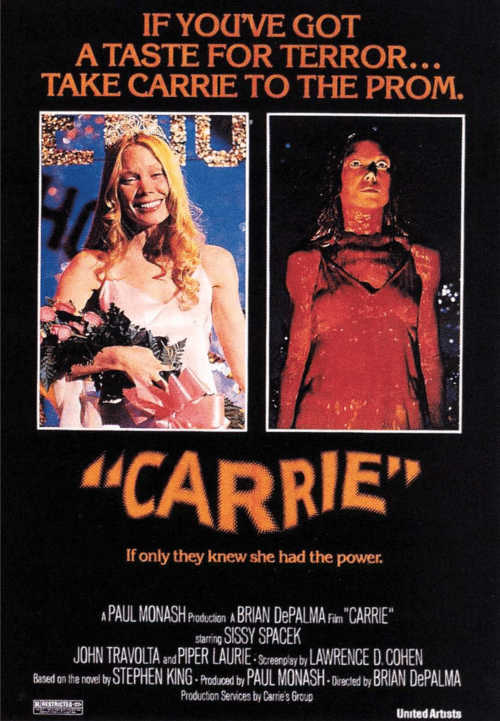
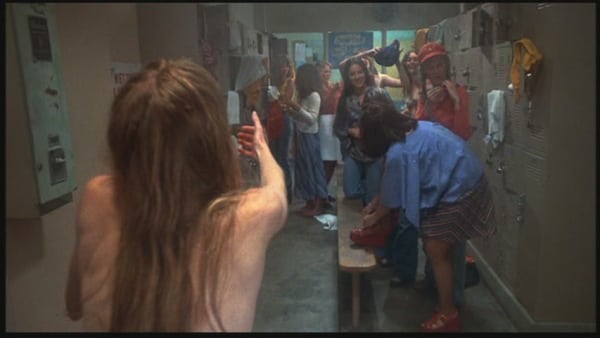
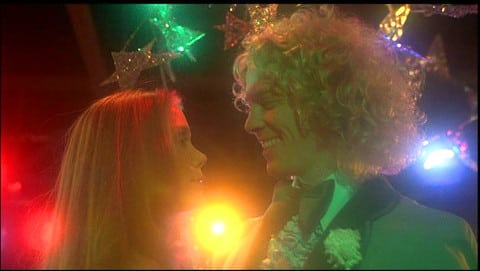


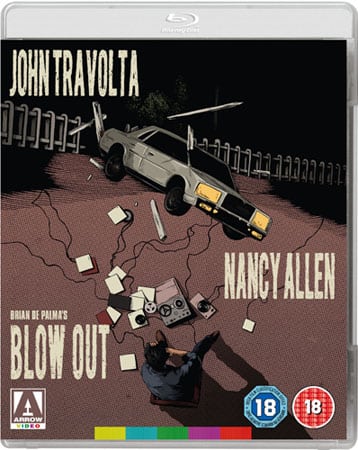
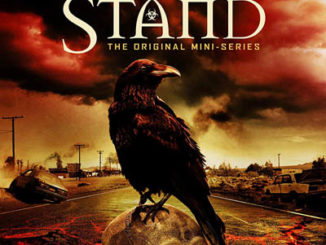
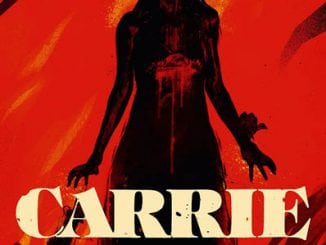
Be the first to comment